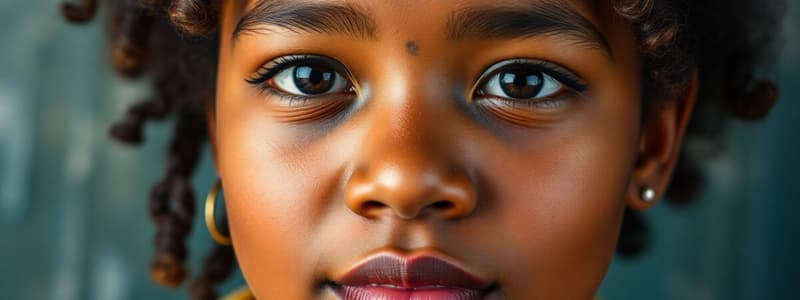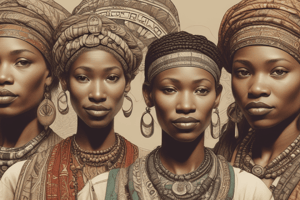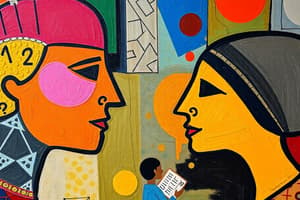Podcast
Questions and Answers
What does the term 'emigrant' refer to?
What does the term 'emigrant' refer to?
- A person leaving their country. (correct)
- A person moving into a new country.
- A person seeking citizenship.
- A person without legal status in a country.
Which legislation restricted citizenship to white people?
Which legislation restricted citizenship to white people?
- Civil Rights Act
- Chinese Exclusion Act
- 14th Amendment
- Naturalization Act of 1790 (correct)
What is implicit bias?
What is implicit bias?
- A widely accepted belief in a society.
- Systemic inequality embedded in policies.
- Conscious prejudice against a group.
- Unconscious stereotypes that affect our judgments. (correct)
What is the primary aim of cultural hegemony?
What is the primary aim of cultural hegemony?
What describes the difference between equity and equality?
What describes the difference between equity and equality?
What is the primary focus of Ethnic Studies?
What is the primary focus of Ethnic Studies?
Which legislation allowed for increased immigration from non-European countries?
Which legislation allowed for increased immigration from non-European countries?
What defines how society perceives an individual’s identity?
What defines how society perceives an individual’s identity?
The concept of privilege refers to:
The concept of privilege refers to:
Which term refers specifically to individuals with mixed racial backgrounds?
Which term refers specifically to individuals with mixed racial backgrounds?
The documentary 'Race: The Power of an Illusion' primarily discusses what theme?
The documentary 'Race: The Power of an Illusion' primarily discusses what theme?
What is intersectionality concerned with?
What is intersectionality concerned with?
The term 'asylum seeker' is defined as someone who:
The term 'asylum seeker' is defined as someone who:
Flashcards
Ethnic Studies
Ethnic Studies
The study of race, ethnicity, and identity to understand inequality and promote social justice.
Social Construct
Social Construct
An idea created by society, not biology.
Race vs. Ethnicity
Race vs. Ethnicity
Race is based on physical traits like skin color; ethnicity is about culture and heritage.
Identity
Identity
Signup and view all the flashcards
Intersectionality
Intersectionality
Signup and view all the flashcards
Origins of Race
Origins of Race
Signup and view all the flashcards
1965 Immigration Act
1965 Immigration Act
Signup and view all the flashcards
Refugee
Refugee
Signup and view all the flashcards
Immigrant
Immigrant
Signup and view all the flashcards
Push/Pull Factors
Push/Pull Factors
Signup and view all the flashcards
14th Amendment
14th Amendment
Signup and view all the flashcards
Tokenism
Tokenism
Signup and view all the flashcards
Systemic Racism
Systemic Racism
Signup and view all the flashcards
Study Notes
Unit 1: Identity Formation
- Ethnic Studies: The study of race, ethnicity, and identity, aiming to understand inequality and promote justice.
- 1965 Immigration Act: Expanded immigration opportunities beyond European countries.
- 1790 Naturalization Act: Limited citizenship to "free white persons."
- Anti-Miscegenation Laws: Outlawed interracial marriage.
- BIPOC: An acronym for Black, Indigenous, and People of Color.
- Citizenship: Legal status with associated rights and responsibilities in a country.
- Class: Social and economic group in society.
- Culture: Shared traditions, beliefs, and behaviors among a group.
- Dialogue Principles: Guidelines for respectful conversations.
- Ethnicity: Shared culture, language, or ancestry.
- Eugenics: A false science promoting racism and discrimination.
- Externally vs. Internally Constructed Identity: How society defines you versus how you perceive yourself.
- Hispanic vs. Latino: Terms with varying meanings depending on context and heritage.
- Identity: Defining characteristics that make a person unique.
- Intersectionality: How different aspects of identity (e.g., race, gender, class) intersect.
- Loving v. Virginia: Supreme Court case that invalidated anti-miscegenation laws.
- Minority: A group holding less power and representation in society.
- Mixed Race: Individuals with multiple racial backgrounds.
- Nationality: Affiliation with a particular country.
- Origins of Race: Race is a social construct, not biological.
- People of Color: A general term for non-white racial groups.
- Positionality: Understanding how one's identity influences their perspective.
- Preferred Nomenclature: Respectful ways to refer to diverse groups.
- Privilege: Unearned advantages based on identity.
- Race: A socially constructed concept based on physical characteristics.
- Race vs. Ethnicity: Race refers to physical traits, while ethnicity encompasses culture and heritage.
- Social Construct: A concept created by society, not inherent.
- Social Identity Groups: Groups categorized by elements like race, gender, or religion.
- Third World Liberation Front: A 1960s student group advocating for ethnic studies.
- Unearned Privilege: Advantages gained without effort, specifically related to race.
- White Privilege: Unintentional benefits provided to white people due to racial bias.
- Race: The Power of an Illusion: A documentary challenging the biological basis of race.
Unit 2: Citizenship, Belonging, and Media
- Migration: Movement from one place to another.
- Migrant: Someone who moves for personal or economic reasons.
- Refugee: Person forced to leave due to danger.
- Asylum Seeker: Person seeking safety in another country.
- Immigrant: Person entering a new country.
- Emigrant: Person leaving their country.
- Push/Pull Factors: Factors motivating people to leave or relocate to a place.
- 1790 Naturalization Act: Limited citizenship to white individuals.
- 14th Amendment: Granted citizenship to all persons born in the U.S.
- Chinese Exclusion Act: A law restricting Chinese immigration.
- Media: News, television, social media, and other forms of communication.
- Tokenism: The act of superficially incorporating diversity to appear inclusive.
- Implicit Bias: Unconscious, often negative stereotypes.
- Counter-Stereotype: A positive, accurate representation that contradicts a stereotype.
- Danger of a Single Story: TED Talk about the limitations of single perspectives regarding cultural groups.
- Diversity in Media: Importance of multiple voices and perspectives in media.
Unit 3: Systems of Oppression
- Four I's of Oppression:
- Ideological: Beliefs justifying inequality.
- Institutional: Discrimination embedded in systems.
- Interpersonal: Discrimination between individuals.
- Internalized: Internalizing stereotypes about oneself.
- Redlining: Discriminatory housing practices harming people of color.
- Japanese Internment: Forced relocation of Japanese Americans during WWII (Executive Order 9066).
- Mass Incarceration: High rates of imprisonment.
- Causes: War on Drugs, tough-on-crime policies.
- Impacts: Family disruption, harm to communities of color.
- Cultural Hegemony: Dominance of one culture over others.
- Equity vs. Equality: Equity seeks fairness, while equality provides equal treatment.
- Racism: Prejudice plus power.
- Systemic Racism: Racism embedded within societal systems.
- Conscious Hip Hop: Hip Hop music that addresses societal injustice.
Studying That Suits You
Use AI to generate personalized quizzes and flashcards to suit your learning preferences.



